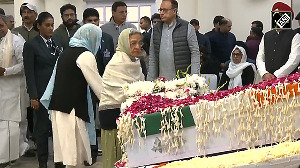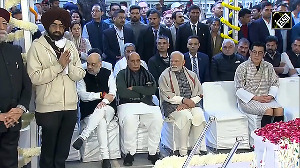As senior Bush administration officials and diplomatic sources -- who were part of the US-India civilian nuclear deal had predicted in earlier interviews with rediff India Abroad -- that the pending legislation that could ultimately lead to the finalisation of the deal would be voted out of the committees by June end, both the House International Relations and Senate Foreign Relations Committees have scheduled mark-up for June 21 and June 23 respectively, a precursor to floor action by the full House and Senate.
The sources said that over the past two weeks after Congress reconvened after the Memorial Day recess, Under Secretary of State for Political Affairs Nicholas Burns -- the chief US negotiator of the deal -- along with other senior officials from both the State Department and the National Security Council -- has continued to pound the corridors of Congress in both the House and Senate, meeting with lawmakers and providing them with updates of the continuing negotiations with India on the bilateral civilian cooperation agreement -- the 123 Agreement -- as well as where New Delhi stood with the International Atomic Energy Agency with regards to the safeguards agreement, and urging them to vote the legislation out of the respective committees for final action.
The sources said Burns' meetings had been supplemented by calls to key lawmakers by Secretary of State Condoleezza Rice, which had led to the decision by the House International Relations and Senate Foreign Relations Committees chairs, Congressman Henry Hyde, Illinois Republican, and Senator Richard Lugar, Indiana Republican, to agree to the mark-ups after nearly two months of hearings and fears that these hearings could continue and tie up the legislation even before it got voted out of the committees.
Leading lights of US business and industry led by the likes of Jeffrey Immelt, chairman and CEO of General Electric, who had gone on overdrive meeting with Lugar and Hyde and other members of the hierarchy of these key committees, supplemented by lobbying by the Indian American community, had catalysed the decision by these committees to cry halt to the spate of hearings and schedule the mark-ups.
"The hearings process is over and now we are in the final two-week crush of intensity and now is the time to re-convey and re-articulate our message upon the Hill," one source said.
"We are now in the mark-up process and the goal is that the mark-up does not cross any red lines -- no amendments or conditions that would otherwise frustrate the deal going through," the source added.
Another senior administration official acknowledged, "The double-team approach of industry and the Indian American community has been very effective, and while sending a letter is good as our planting op-eds in leading newspapers, which are also wonderful as it generates an inside the beltway debate, the best results have come from real investors in India and Indian Americans going up to Capitol Hill, sitting down with the leadership and explaining to lawmakers how important this deal is -- that it is much bigger than simply the sale of nuclear reactors to India, but the very core of the strategic relationship between the US and India."
Ron Somers, president of the US-India Business Council, in acknowledging that the USIBC's lobbying firm Patton Boggs -- engaged exclusively to push for the approval of the deal in Congress -- had lined up meetings for the likes of Immelt and other CEOs from firms such as Boeing, Ford Motor Company, Federal Express, American International Group, Lockheed Martin, with the key lawmakers to impress upon them the importance of this deal and "that this is about a deepened partnership that is going to converge these two economies and align these two democracies in the 21st century."
"These kinds of sessions have been very helpful and we've been launching a lot of these up on Capitol Hill over the last one month specially," he added.
"These are companies that are members of the Coalition for Partnership with India core committee that have taken a keen interest in ensuring that the deepened strategic partnership actually comes to fruition," Somers told rediff India Abroad.
"Our job is to mobilise the membership interest," he said, but that when "it comes time for a meeting with Senator Lugar's people for example, of course it helps to have ITT industry -- because they are the largest employer in Indiana etc -- to meet with them."
Somers said these meetings had been choreographed by Patton Boggs "who have been very helpful in organising these strategies as to who will be the most effective spokespeople at these meetings."
He said these efforts had been strongly supplemented by the US-India Friendship Council led by Swadesh Chatterjee working in concert with the Coalition for Partnership with India and also associations like the Aerospace Industries Association "who have also stepped forward and that has been extremely helpful."
Diplomatic sources said that Indian Ambassador Ronen Sen "continues meeting people -- several Senators and Congressman -- while other officers continue their meetings with Congressional aides," trying to clear up any concerns they may have.
"Of course, the administration has been making a huge push in the last two weeks as you know with Nick Burns and Condi Rice herself working at it almost on a daily basis,"one source noted.
Both administration and diplomatic sources said that the focus was now on the mark-up and getting it out of the committee without any strings attached, but they acknowledged that even if that happens there is sure to be several amendments attempted to be attached to the legislation during floor debate.
"When it goes to the floor then you know the Markeys (Congressman Ed Markey, Massachusetts Democrat, who is leading the charge in Congress against the deal) and others will try all kinds of stunts,"one source said, but noted that getting the legislation out of the committees where it had remained bogged down for months "would be a great signal by itself and definitely we would like it to move to the floor in July itself."
Meanwhile, in a significant boost to the pro-nuke deal lobby, Congresswoman Sheila Jackson-Lee, Texas Democrat, who though is a longtime member of the Congressional Caucus on India and Indian Americans, who had co-sponsored Markey's anti-nuke deal resolution, took her name off as a co-sponsor of Markey's bill and listed herself as a co-sponsor of HR 4974 -- the administration legislation that calls for an amendment of the Atomic Energy Act of 1954 so that it can facilitate an India-specific exemption that will envisage the US-India nuclear deal to move forward.
Another hold-out, Congressman Sherrod Brown, Ohio Democrat, and one of the founding members of the India Caucus, according to Ohio Indian American activist Nirmal Sinha -- who last week organised a fundraiser for Brown who is running for the US Senate challenging Republican incumbent Mike DeWine -- had put this name down as a co-sponsor of the legislation, increasing the number of co-sponsors to 39.
Besides Jackson-Lee and Brown, they are: Congressmen Gary Ackerman (D-NY), Charles Boustany Jr (R-LA), Michael Conaway (R-TX), Tom Davis (R-VA), Eni Faleomavaega (D-AS), Luis Gutierrez (D-IL), Jeb Hensarling (R-TX), Bobby Jindal (R-LA), Joe Knollenburg (R-MI), John Linder (R-GA), Michael McCaul (R-TX), Frank Pallone (D-NJ), Pete Sessions (R-TX), Joe Wilson (R-SC), Henry Bonilla (R-TX), Dan Burton (R-IN), Joe Crowley (D-NY), Eliot Engel (D-NY), Kay Granger (R-TX), Ralph Hall (R-TX), Jesse Jackson Jr (D-IL), Sam Johnson (R-TX), Tom Lantos (D-CA), Kenny Marchant (R-TX), Gregory Meeks (D-NY), Tom Price (R-GA), Lynn Westmoreland (R-GA), Danny Davis (D-IL), Alcee Hastings (D-FL), Lamar Smith (R-TX), Solomon Ortiz (D-TX), Louie Gohmert (R-TX), James Moran (D-VA), John Carter (R-TX), John Abney Culberson (R-TX), Donald Manzullo (R-IL), and Randy Nuegebauer (R-TX).
Community activist Ashok Mago of Dallas, Texas, told India Abroad, "The Indian American community in Texas has delivered 16 of the co-sponsors and we expect to add another five-seven Congressmen to this list in the next few weeks."
"This is the first time ever that the Indian American community in Texas has mobilised in such a concerted manner to work on such an important issue for India and the Indian American community," he said.
Mago, who noted that the Indian American community in Texas had also delivered both Senators from the state -- John Cornyn and Kay Bailey Hutchison, both Republicans -- as co-sponsors of the administration bill in the Senate, S-2429, said that if Indian Americans in other states take a leaf out of the page of the Indian American community and the way they have mobilised in Texas, "these bills in both Senate will cruise through and bring US and India relations to a level we never could have thought of a few years ago."
Besides Cornyn and Hutchison, all of the other eight co-sponsors were also Republicans and they are Senators Lamar Alexander of Tennessee, George Allen of Virginia, Christopher Bond of Missouri, Sam Brownback of Kansas, Ted Stevens of Alaska, Mike Crapo of Idaho, Pete Domenici of New Mexico and De Wine of Ohio.
A conspicuous hold-out continued to be Senator Hillary Rodham Clinton, New York Democrat, who along with Cornyn, are co-chairs of the Friends of India Caucus in the US Senate.






 © 2024 Rediff.com -
© 2024 Rediff.com -